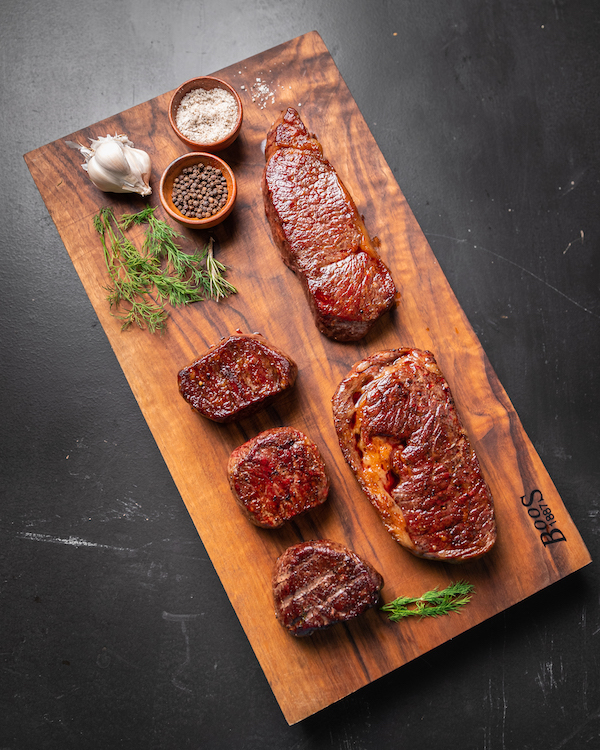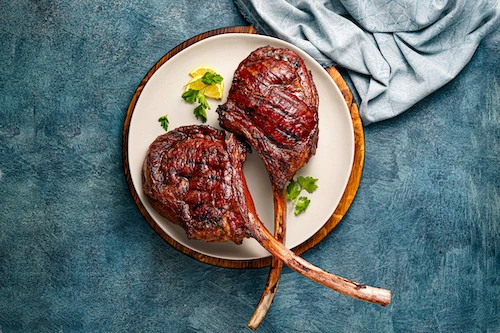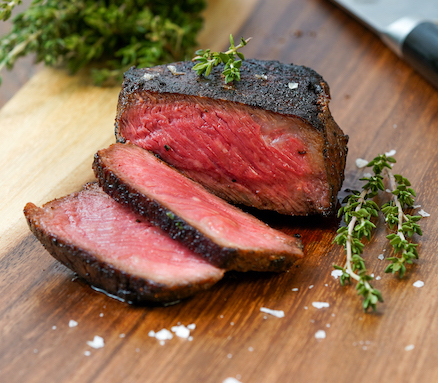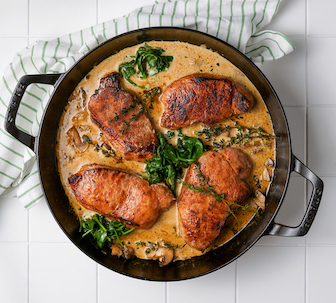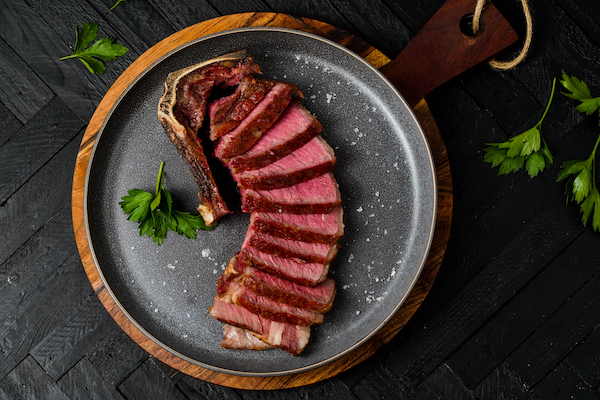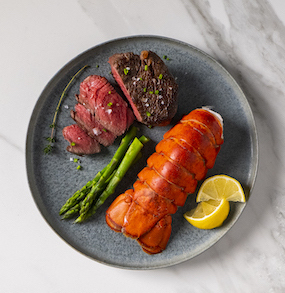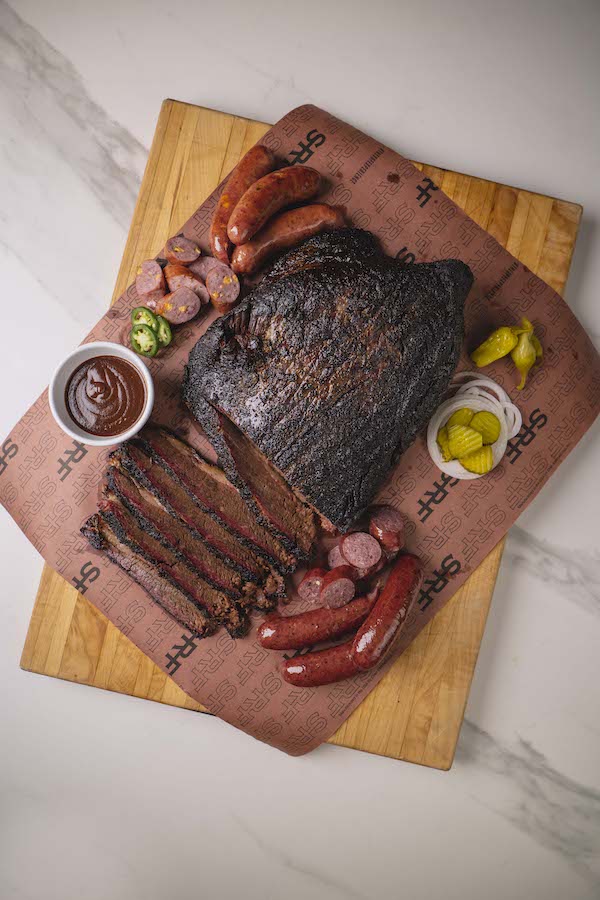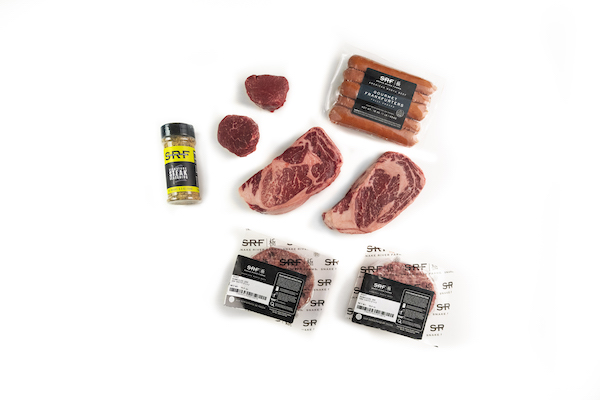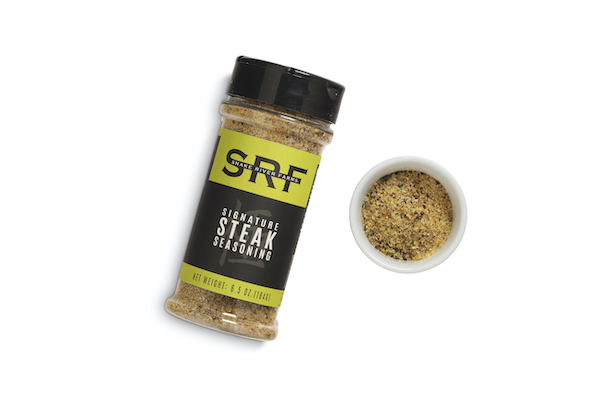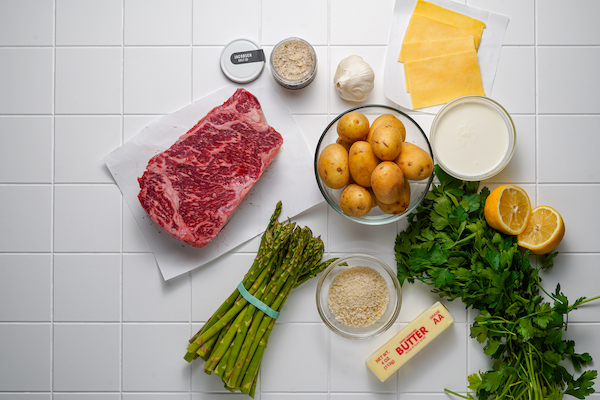The Best Way to Cook a Pork Chop
For the best results, start with pork chops cut at least an inch thick. Choosing heritage pork, like Kurobuta (also known as Berkshire) ensures you’ll serve an appetizing chop. Commodity pork is bred to be lean and doesn’t provide the same delicious eating experience.
Here are two ways to cook the perfect pork chop.
Pan Searing
The general idea for this method is to brown both sides of a thick-cut chop in a skillet, then place it in the oven to finish cooking. This technique works well with Snake River Farms pork Porterhouse, tomahawk, Frenched and boneless chops.
How to pan sear a pork chop:
- Start with a fully thawed pork chop. Place frozen chops on a plate or baking sheet to catch any drips. A metal pan helps to speed up the thawing process. Allow 24 hours to gently thaw.
- Heat oven to 350°F
- Season each chop generously with salt and pepper. You can also use a rub, like the Snake River Farms Perfect Pork Rub.
- Place a cast iron or other heavy skillet on the burner and set to medium high.
- Add a tablespoon or two of neutral vegetable oil (canola, grapeseed or avocado are good choices).
- When the oil is shimmering, place chops in the skillet. Brown the chops (about 2 minutes) then flip and brown the other side.
- Place the skillet and chops in the oven. Remove from the oven when the chops are 135°F (about 8 to 10 minutes).
- Remove the pork chops from the skillet and set on a cutting board. Loosely cover with aluminum foil. Rest for 10 minutes. This allows the temperature to equalize evenly inside the chop. Carryover cooking will cause the internal temperature to rise about 3 to 5 degrees.
- After the chops have rested, serve.








Reverse Sear
This method flips the script from pan searing. The chops are slowly roasted in the oven until they reach 135°F. After a brief rest, the chops are finished in a hot skillet. The advantage of the reverse sear is an even internal cook and an exterior that is more crispy when it comes to the table. This method works well for any Snake River Farms Kurobuta pork chop, but is the recommended way to cook the extra thick double bone pork chop.
How to reverse sear a pork chop:
- Start with a fully thawed pork chop. Place frozen chops on a plate or baking sheet to catch any drips. A metal pan helps to speed up the thawing process. Allow 24 hours to gently thaw. The double bone pork chop may take 8 hours longer.
- Heat oven to 275°F
- Season each chop generously with salt and pepper. You can also use a rub, like the Snake River Farms Perfect Pork Rub.
- Place chops on a rimmed baking sheet with a wire rack. This elevates the pork away from the metal and allows heat to flow underneath.
- Remove from the oven when the internal temperature is 135° Approximate cook times are 35 minutes for single boned and boneless chops and 60 minutes for double bone chops. Times will vary based on each oven, so start checking temperatures about 15 to 20 minutes into the cook.
- Place the pork chops on a cutting board and loosely cover with aluminum foil. Rest for 10 minutes. This allows the temperature to equalize and continue cooking. The internal temperature to rise about 3 to 5 degrees.
- Place a cast iron or other heavy skillet on the burner and set to medium high.
- Add a tablespoon or two of neutral vegetable oil (canola, grapeseed or avocado are good choices).
- When the oil is shimmering, place chops in the skillet. Brown the chops (about 2 minutes) then flip and brown the other side.
- Remove from the pan and serve. No additional resting is required.








DONENESS TEMP FOR PORK CHOPS
The ideal internal temperature for cooked pork chops should be 145°, essentially a medium rare doness with a pink center. When resting from 135°, the pork chop will gradually rise to the proper doneness.
In the 1960s and 70s, rare pork was associated with trichinosis. This fear continues to cause contemporary home cooks to overcook their chops. Today’s production methods are improved and very food safe. This means for the best results pork chops should be served closer to medium to maintain a high level of juicy flavor.
OUR FAVORITE PORK CHOP RECIPES
The culinary experts at Snake River Farms have put together some of the most flavorful recipes for the Kurobuta pork chop.
Here are just a few of our favorite pork chop recipes:
FREQUENTLY ASKED QUESTIONS ABOUT PORK CHOPS
Yes, a pork chop with a pink center is considered a medium rare doneness and is safe to eat at an internal temperature of 145°.
It is not recommend to wash raw pork as this increases the likelihood of contaminating the cooking area. Kurobuta pork chops from Snake River Farms are produced to the highest of standards and do not require washing before cooking.
Pork chops do not shred well and so they are not a good option for pulled pork. Pulled pork is better suited to pork cuts such as the pork collar that have the required amount of fat and connective tissue to break down over a slow cooking process.

